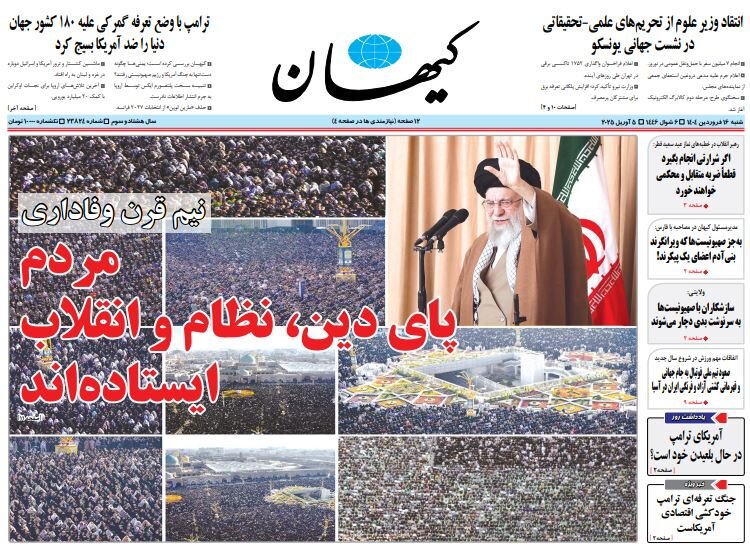Tehran – In his article, Kayhan addresses the contradictions in Washington’s policy, writing:
On the one hand, it uses the language of threats and sanctions to the Islamic Republic of Iran, while on the other it speaks of negotiation and interaction. This contradictory policy vision has been on the White House leader’s agenda for many years, but has been pursued with greater strength by Trump recently. One day, Trump talks about Iran’s “decisive conflict and destruction” and the next day the possibility of negotiations without prerequisites! This is the same old “carrot and stick” policy that Americans have always adopted to deceive public opinion and gain unilateral concessions. Trump and his warm team, made up of Zionists and neoconservatives, are very well aware that Iran’s Islamic Republic is an independent and powerful country that is not threatened or fooled by diplomatic smiles. One of the greatest lessons Iran and other countries have learned from American policy is that Washington is the most unreliable country in international relations. Iranians have repeatedly shown that they are united and resilient to American hostile policies.
Jam-e-Jam: Many opportunities for collaboration with Tehran and Riyadh
In the memo, Jam-e-Jam is working on increasing ties with Iranian neighbors, particularly Saudi Arabia. Essentially, the strategy of the Islamic Republic of Iran is to develop relationships with neighbors in various political, security, economic, commercial and cultural fields. Last year (Persian calendar year, which fell from March 2024 to March 2025), relations between Iran and Saudi Arabia improved. Iran and Saudi Arabia supported the oppressed people in Palestine and Gaza and worked closely on issues condemning Israel’s occupation of Arab lands. We consider a wide range of deep cooperation, and Iran and Saudi Arabia can contribute to regional peace and stability by working together. We continue to anchor our hopes for this cooperation in the bilateral and multilateral sectors for economic development and stability in the region. We believe that regional countries can determine their fate by highlighting endogenous safety and cooperation without being influenced by external variables or foreign interference.
Hamshahri: New customer of Iranian weapons
In his commentary, Hamshali highlighted Iran’s participation in the 2025 Latin American Defense (LAAD) International Exhibition held in Rio de Janeiro, Brazil. Iran’s participation in Brazil’s Aerospace and Defense Exhibition provided the Islamic Republic with the opportunity to display defence equipment in Latin America. The Iranian pavilion attracted the attention of many visitors. According to the “Asia Live” website, Brazilians’ interest in Iranian weapons is more than anything, a sign of a growing desire for Brazil’s strategic autonomy. Non-Western weapons manufacturers, including Iran, have acquired positions in Latin America, which weakens the US status as a traditional supplier of weapons in the region. The purchase of Iranian drones in Brazil could be a diplomatic challenge for Washington as the US has long considered Latin America as a “strategic backyard” and has strengthened its influence through military aid, defense sales and security partnerships.
Sharg: Why do Arab countries distance themselves from the conflict between Iran and the US?
Shargue looked into why Arab countries in the Persian Gulf are opposed to the US military threat to Iran. According to this paper, in recent years, the approach to Arab states in the Persian Gulf towards a regional crisis, particularly the tension between the Islamic Republic of Iran and the United States, has been accompanied by a kind of strategic attention and political consideration. First of all, economic interdependence in the region is a key factor in the development of such prudent policies. From a geopolitical perspective, Arab countries are aware of changing power in regional areas and are looking to play an active role in regional security. This is part of an effort to launch regional diplomacy aimed at removing tensions, engaged in dialogue with Tehran, reducing security reliance on local management, and increasing independent role-play in future regional systems. Regional Arab countries generally understand that the costs of falling into conflict between Iran and the United States exceed national and regional tolerance. Strategic rationality must play the role of mediators in the path to stability rather than creating tension.

